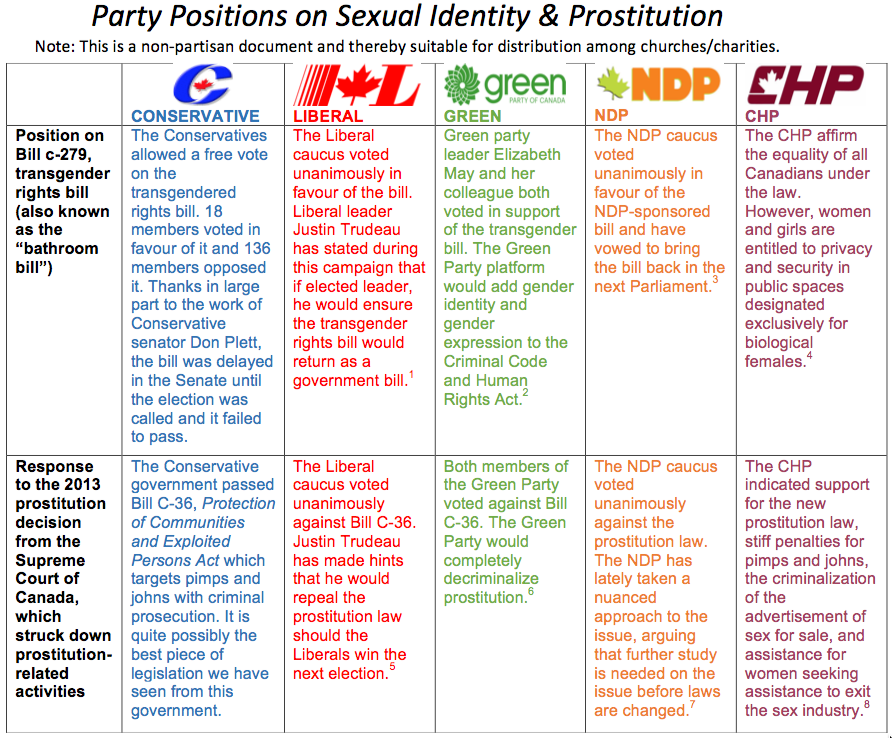Election 2015 Guide: Sexuality and Prostitution

Deeper Analysis: Transgenderism
What’s the issue? Transgenderism, or Gender Identity Disorder (GID), or gender dysphoria, involves a desire to
change one’s sex or to take on the social persona of the opposite sex. Most provinces have now enshrined in law the idea that gender is not fixed but fluid, that there are more than two genders, and that what ultimately matters is how one person feels about their own gender, rather than what their biological sex actually is. Those pushing this political agenda are attempting to enshrine in law protections for the right to act and dress as the other sex and to be treated by the government and the rest of society as if they are, in fact, the opposite sex.
What does the Bible say? Most basic to our understanding of sex is that God created two (and only two) genders that correspond to the two biological sexes: “male and female He created them” (Gen. 1:27). All the modern-day speculation about numerous genders—or even a gender “continuum” with unlimited genders—is unbiblical. The Bible also shows that this is not a modern phenomenon: “A woman must not wear men’s clothing, nor a man wear women’s clothing, for the Lord your God detests anyone who does this” (Deut. 22:5).
How can a Christian respond politically? The medical/psychiatric evidence corresponds to God’s design of the human person: gender dysphoria is a condition to be treated. When transgenderism is embraced, it leads to devastating effects for transgendered individuals. Out of love for our transgendered neighbours, Christians must speak with grace against the normalization of transgenderism. There is good news: the effects of sin can be changed through faith in Christ: “And this is what some of you were. But you were washed, you were sanctified, you were justified in the name of the Lord Jesus Christ and by the Spirit of our God” (1 Cor. 6:11). There is hope for all of us sinners, transsexuals and transgenders included, because of God’s forgiving and transforming grace available in Jesus Christ.
For more on the issue of transgenderism, including gospel resources, visit: www.ARPAcanada.ca/transgender
Deeper Analysis: Prostitution
What’s the issue? Prostitution was a headline issue in the last four years because the courts struck down Canada’s laws against activities related to prostitution (though the actual exchange of money for sex was legal). Parliament responded with a robust law in which pimps (those who sell prostitutes) and johns (those who buy prostitutes) are directly targeted and the purchase and advertising of sexual services is made illegal. The majority of prostitutes want to get out of the sex trade. This new law does not criminalize the actual prostitute but instead aims to get them out of the industry while also cutting down the demand by making the purchase of sexual services illegal. It is good that the shift in attention of the criminal law has swung to those who use other people as objects of sexual gratification. An opposing view is that prostitution should be legalized between consenting adults. However, this approach does nothing to minimize the incredible social damage of the objectification of the human body and the degrading of God’s gift of sexuality.
What does the Bible say? The Bible is very clear about the evil of prostitution (Lev. 21:9, Deut. 23:17- 18, Prov. 29:3, 2 Kings 23:7, etc.). Sexual activity was created by God and designed for marriage. When sex is expressed outside of the confines of marriage it leads to increased risks of harm to self and society. Prostitution is degrading and is both dangerous and exploitative.
In the Old Testament, there is a group of vulnerable people that come up again and again, often clumped together: the sojourner, the widow and the fatherless. That trio (sometimes joined by “the needy”) is repeated at least 26 times in the Old Testament. There is a remarkable connection between that phrase and the characteristics of most prostituted women in the modern day sex trade. It is also clear from scripture that God has a special place for the vulnerable. Paul picks up this line of protection in his warning against those who live ungodly lives, stating that the law is made for those who are lawless including (among others) “slave traders” or “kidnappers” (1 Timothy 1:10).
How can a Christian respond politically? The biblical principles above suggest we ought to support criminal laws that target those who profit from the prostitution of others. Christians must recognize that the law cannot fully eliminate the harm and sin of prostitution. However, we should look to a law that mitigates the harm as much as possible. From ARPA’s research, Canada’s new prostitution law does that and should remain in place.
For more on the policy related to prostitution, see ARPA’s policy report on prostitution at www.ARPAcanada.ca/prostitution1
For more on a Christian approach to discussing prostitution with a secular audience, check out www.ARPAcanada.ca/prostitution2
——————
[2] http://www.greenparty.ca/en/policy/vision-green/people/rights/lgbt
[4] Statement from CHP emailed to ARPA Canada.
[8] Statement from CHP emailed to ARPA Canada.